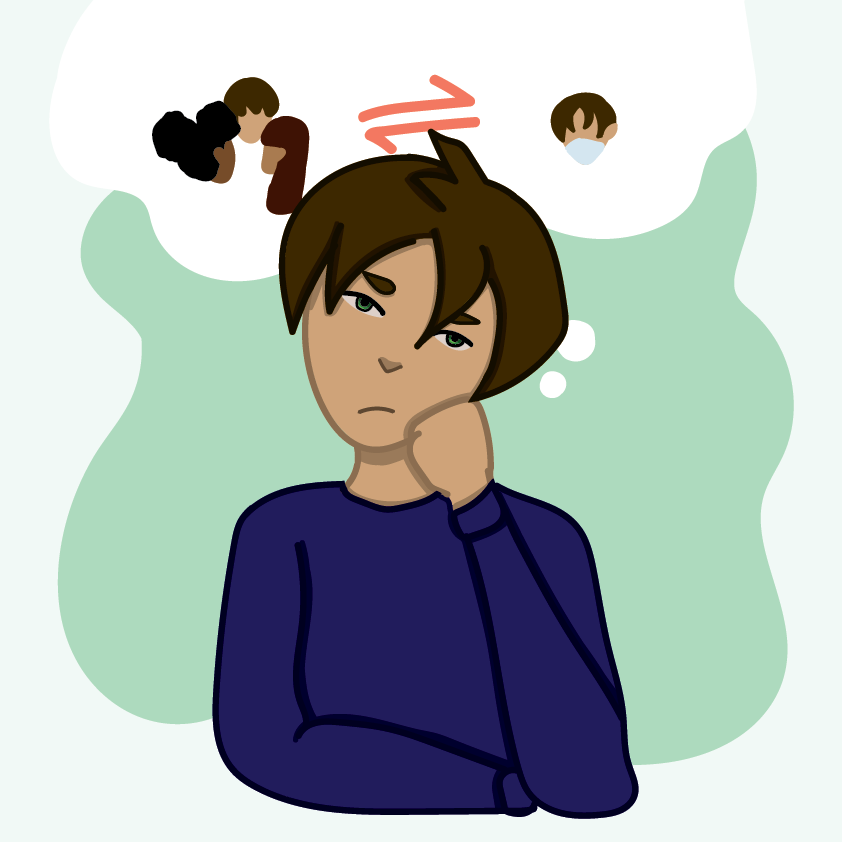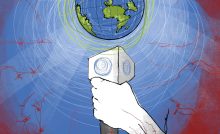Opinion | Is 2022 the year of apathy?


I was chatting with a professor last week about the frustration of making theater productions during a pandemic, yet again. We made pivot after pivot in 2020, determined to get back on a stage — even if it was a virtual one. Now, two years since I’ve been on a stage without a mask, I’m exhausted.
Making socially distanced theater — eight feet apart with KN95 masks — feels like exponentially more work with exponentially less reward. Frankly, I’m losing the light at the end of the tunnel. It feels like we need to choose between our safety and the preservation of our passions. And theater makers aren’t the only ones facing this seemingly impossible decision. Although, it seems like more and more industries are opting for the former.
The CDC announced in late December that it would halve the recommended isolation period for those who have tested positive but whose symptoms have subsided, in order to minimize “disruptions” to society. Pitt’s COVID-19 Medical Response Office wrote last Thursday that cases may be starting to “stabilize,” after adding a total of 438 cases among students and employees between Jan. 19 and Jan. 25. It seems we’re sort of shifting away from stopping the spread and, instead, prioritizing a much-desired yet possibly preemptive return to normalcy.
The conversation with my professor brought me to one of my favorite columns of the past year. The New York Times’ Adam Grant coined 2021 as the year of “languishing,” what he refers to as the “neglected middle child of mental health.”
“It’s the void between depression and flourishing — the absence of well-being,” he said. “You’re not functioning at full capacity. Languishing dulls your motivation, disrupts your ability to focus and triples the odds that you’ll cut back on work.”
If that explanation defined much of your 2021, then the sentiment has only deepened. Amid yet another surge of COVID-19, another bat with virtual classes and another year of “pivoting,” apathy has become the name of the game. It seems we’re giving up — whether it’s becoming more and more pessimistic about performing, sacrificing some worker safety to preserve the workforce or seeming to ignore rising cases. But we need to change our outlook — and fast — or else two years of mitigation effects will be for naught.
Leon Seltzer, an author who specializes in the paradoxes of personality, explains that while apathy may have many causes — ranging from a lack of sleep, to poor diet, to schizophrenia — its effects are clear.
“True, apathy is a feeling. But it’s also an attitude,” Seltzer said. “Either they’ve ceased to believe in the intrinsic value of the goals they’d earlier set for themselves, or they’ve lost faith in their ability to achieve these goals. So they can’t think of anything worth striving for.”
For two years, we’ve — hopefully — prioritized our safety over our passions. And yet, due to vaccine hoarding, hesitancy and misinformation, we’re still doomed to face yet another disruptive variant.
It feels like nothing is worth it. Despite our mitigation efforts, we’re still combatting another variant. No efforts to create safe theater make it feel like we’ve fully reclaimed the stage, nor do in-person classes without precautions feel safe. We’re doomed if we do and doomed if we don’t.
Yet, recognizing and combating this apathy is essential. There will be a day — not nearly as soon as we wish — that we’ll enter classrooms, workplaces and theaters without masks. We need to keep our gifts and passions alive long enough to see it. But all of our efforts to mitigate will have been for nothing unless we continue to actively protect those at risk.
Luckily, we have some autonomy over our apathy.
A lack of sleep is one of the driving forces behind our apathy. The pandemic has also been proven to negatively impact our quality of sleep, as chronic stress continually sends signals to our autonomic nervous system and keeps us in a consistently restless state of fight-or-flight. There are a few ways to boost our ability to combat this exhaustion. Changes in our diet help our bodies combat stress. Similarly, setting a firm sleep routine helps our bodies naturally optimize for quality sleep.
But sleep isn’t everything. As Seltzer noted, because apathy is an attitude, the best way to combat it is through intentional deprogramming.
“Regardless of what initially caused you to feel so unmotivated, it’s your present-day outlook on it that now keeps you stuck,” he said. “Your immediate task, then, is to alter this outlook. In short, you’re much better off focusing on how to fix what’s inside your head than what lies outside it.”
So, I’m spending my time in the theater. I’m masking up and getting boosted. I’m enjoying the few possibilities for in-person engagement that are presented safely and cautiously. Languishing defined too much of our college experience. It’s imperative we don’t let apathy define the rest of it.
Julia is a senior studying political science, English writing, and theatre arts. She writes primarily about socio-political issues. Write to Julia at JRK142@pitt.edu.
Recent Posts
SGB addresses concerns about ICE presence on campus, hears SJP lawsuit against administration, approves governing code bill
At its weekly meeting on Tuesday at Nordy’s Place, Student Government Board heard concerns about…
ACLU of Pennsylvania sues Pitt over SJP suspension
The ACLU of Pennsylvania filed a federal civil lawsuit against the University of Pittsburgh and…
Marquan Pope: The ultimate shark
One of the most remarkable things about sharks is that an injury doesn’t deter them.…
Who Asked? // Do we really get a summer vacation?
This installment of Who Asked? by staff writer Brynn Murawski mourns the seemingly impossible perfect…
Notes From an Average Girl // Notes from my junior year
In this edition of Notes From an Average Girl, senior staff writer Madeline Milchman reflects…
Meaning at the Movies // The Power of the Movie Theater
In this edition of “Meaning at the Movies,” staff writer Lauren Deaton discusses her love…
